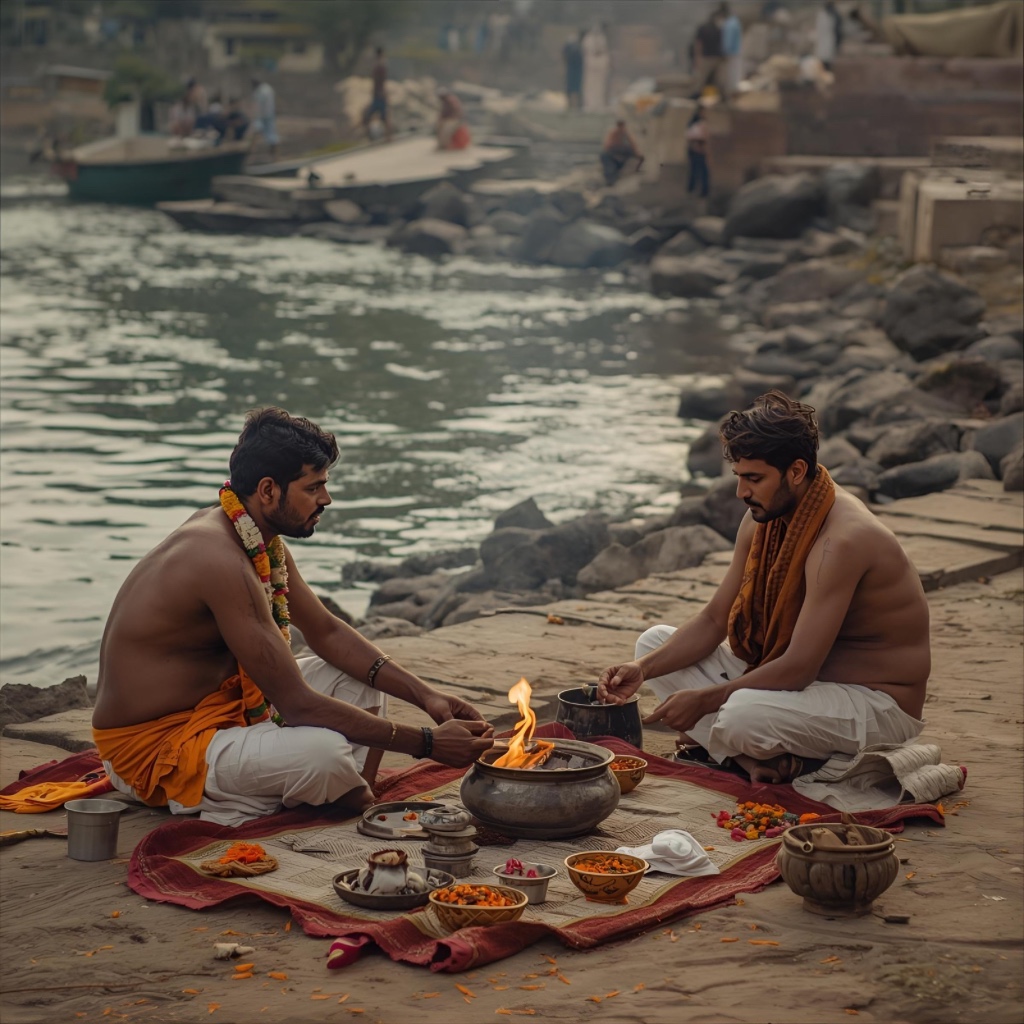Why Pitru Paksha is Celebrated – Meaning, Importance & Significance
-
09-09-2025
-
106
Introduction
In Hindu tradition, Pitru Paksha, also called Shraddh Paksha, holds immense spiritual and cultural value. It is a 16-day period dedicated to paying homage to one’s forefathers and ancestors, a time when families express their gratitude through rituals and offerings. The very essence of Pitru Paksha lies in the belief that our lives are deeply connected with the blessings of those who came before us, and by honoring them, we maintain the eternal cycle of love, respect, and duty.
This sacred observance falls during the Krishna Paksha (waning moon fortnight) of the Hindu lunar month of Bhadrapada (around September–October). During this fortnight, Hindus perform Shraddh, Pinda Daan, and Tarpan rituals to seek blessings and ensure peace for their ancestors’ souls.
Meaning of Pitru Paksha
The word ‘Pitru’ means ancestors, and ‘Paksha’ means fortnight, thus Pitru Paksha literally translates to “the fortnight of the ancestors.” It is believed that during these 16 days, the souls of the departed leave their realm and descend to Earth to visit their descendants. By performing specific rituals, devotees not only honor their Pitrs but also fulfill their spiritual obligation known as Pitru Rina (debt of the ancestors).
Hindu scriptures like the Garuda Purana and Manusmriti emphasize that a person is born with three types of debts – to the gods (Deva Rina), to the sages (Rishi Rina), and to the ancestors (Pitru Rina). Among these, Pitru Rina is fulfilled by performing Shraddh rituals during Pitru Paksha.
Why Pitru Paksha is Celebrated
The celebration of Pitru Paksha is deeply rooted in mythology and dharma. It is said that without offering Shraddh, the soul of a departed ancestor may wander unsatisfied, causing Pitru Dosha (ancestral imbalance) in the family.
The Mahabharata narrates a story of Karna, the son of Surya. After his death, Karna ascended to heaven where he was served gold and jewels instead of food. When he questioned this, he was told it was because he had donated wealth but never food to his ancestors. Filled with remorse, Karna prayed to Lord Indra, who allowed him to return to Earth for 16 days to offer food and water to his forefathers. These 16 days became known as Pitru Paksha, establishing the tradition of performing Shraddh to satisfy ancestral souls.
Importance of Pitru Paksha
Gratitude to Ancestors: Pitru Paksha is a way of expressing thankfulness for the life, culture, and traditions passed down through generations.
Spiritual Duty: Performing Shraddh is considered an obligatory duty (dharma) for every Hindu.
Ancestral Blessings: It is believed that when ancestors are pleased with Shraddh offerings, they bless their descendants with prosperity, health, and success.
Removing Pitru Dosha: Performing rituals during this time helps in removing obstacles caused by ancestral imbalances.
Liberation of Souls: Shraddh ensures peace and progress of the departed souls on their journey toward liberation (moksha).
Significance of Rituals Performed During Pitru Paksha
Pinda Daan: Offerings of rice balls, sesame seeds, and barley mixed with ghee are made, symbolizing nourishment for the souls.
Tarpan: Water mixed with black sesame seeds is offered while chanting mantras to please the ancestors.
Feeding Brahmins & Cows: Serving food to Brahmins, saints, and cows is believed to transfer merit to the ancestors.
Charity: Donating food, clothes, and essentials during Pitru Paksha is considered highly auspicious.
Each ritual carries symbolic meaning. Offering food satisfies the hunger of the departed souls, water quenches their thirst, and charity performed in their name earns blessings for the entire family.
Regional Observances of Pitru Paksha
Pitru Paksha is observed across India with regional variations:
- In Gaya, Bihar, lakhs of devotees perform Pinda Daan at the sacred Vishnupad Temple.
- In Maharashtra, special Shraddh pujas are performed near holy rivers.
- In South India, offerings are made at temples and riversides to honor ancestors.
- In West Bengal, Pitru Paksha is observed before the onset of Durga Puja, marking respect for ancestors before celebrating the goddess.
Pitru Paksha and Modern Relevance
Even in today’s fast-paced life, Pitru Paksha holds great importance as it reconnects families with their roots. It emphasizes the values of gratitude, respect, and remembrance. Families gather to perform rituals, cook traditional foods, and donate in the name of their ancestors, ensuring the continuity of culture and spiritual connection.
Many believe that neglecting ancestral duties may result in Pitru Dosha, which can cause hurdles in marriage, finances, or health. Performing Shraddh during Pitru Paksha is believed to balance this energy and bring prosperity.
Do’s During Pitru Paksha
- Perform Shraddh Rituals: Offer Pinda Daan, Tarpan, and food to ancestors with sincerity and devotion.
- Charity & Donation: Donate food, clothes, grains, or essentials to Brahmins, cows, and the needy.
- Cook Satvik Food: Prepare simple, vegetarian meals without onion, garlic, or strong spices for the rituals.
- Feed Cows, Dogs, and Birds: Offering food to animals is considered equivalent to feeding ancestors.
- Maintain Cleanliness: Keep yourself and your surroundings pure before performing rituals.
- Offer Water (Tarpan): Always include sesame seeds with water while offering to ancestors.
- Respect Elders: Show humility and serve elders in the family—it is seen as serving ancestors directly.
Don’ts During Pitru Paksha
- Avoid Auspicious Beginnings: Do not conduct marriages, engagements, housewarming, or naming ceremonies during this period.
- No Haircuts or Shaving: Cutting hair, beard, or nails is traditionally avoided as a mark of mourning.
- Avoid Non-Veg & Alcohol: Strictly refrain from consuming meat, fish, eggs, or intoxicants.
- No Anger or Arguments: Keep the mind calm; anger or negativity is believed to displease the ancestors.
- Do Not Waste Food: Leftover or wasted food during Shraddh is considered inauspicious.
- Avoid Buying Luxury Items: Major purchases like vehicles, gold, or property are usually postponed till Pitru Paksha ends.
- No New Projects: Starting business ventures, construction, or big investments is generally avoided.



Woah! I’m really digging the template/theme of this blog. It’s simple, yet effective. A lot of times it’s tough to get that “perfect balance” between user friendliness and visual appeal. I must say you’ve done a amazing job with this. In addition, the blog loads super quick for me on Chrome. Exceptional Blog!
I am impressed with this web site, rattling I am a big fan .